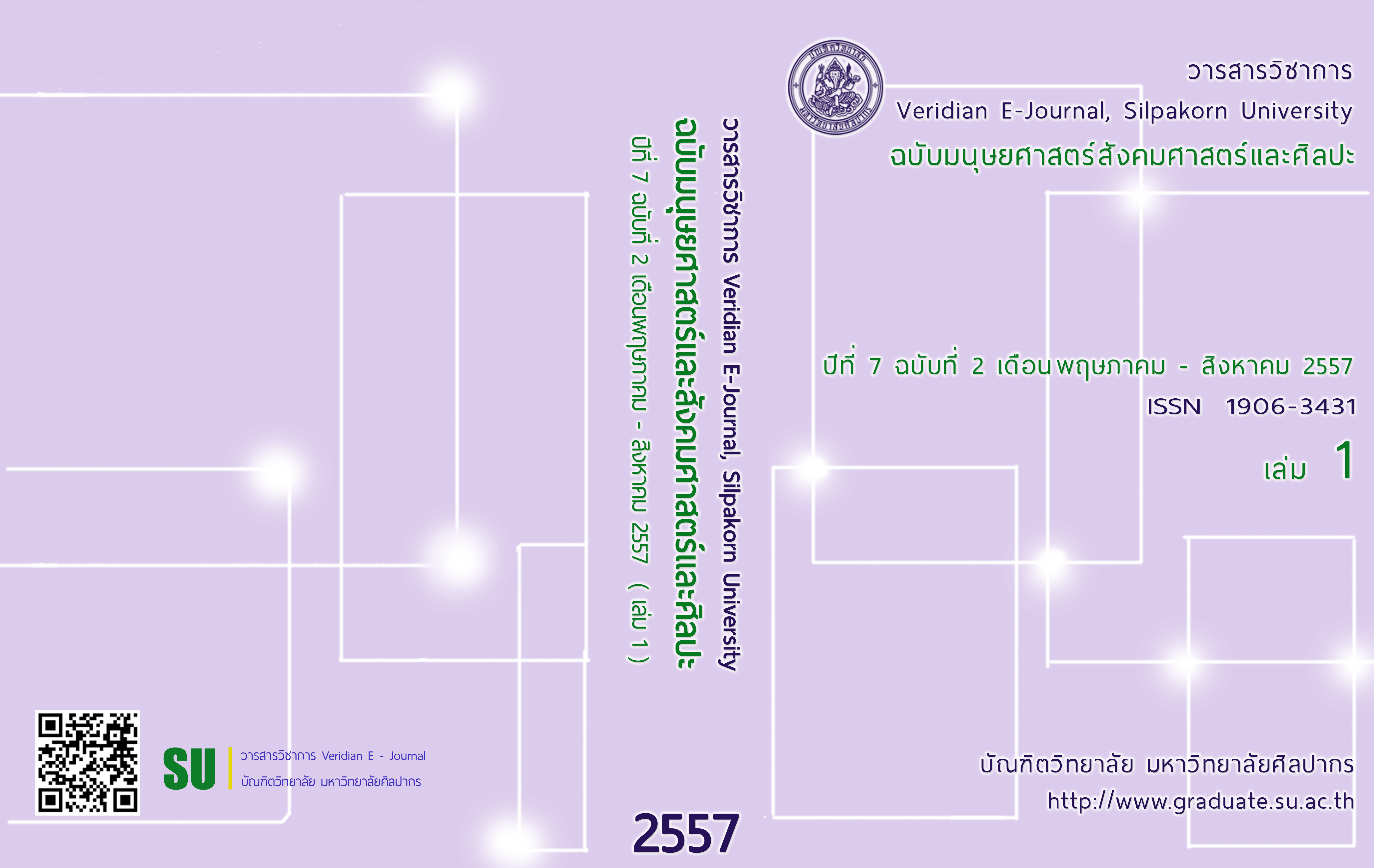การพัฒนารูปแบบการเรียนการสอนตามแนวคิดการจัดการความรู้ กับภูมิปัญญาท้องถิ่น สำหรับนักเรียนชั้นมัธยมศึกษา
Main Article Content
Abstract
บทคัดย่อ
การวิจัยในครั้งนี้มีวัตถุประสงค์เพื่อ 1) พัฒนารูปแบบการเรียนการสอนตามแนวคิดการจัดการความรู้กับภูมิปัญญาท้องถิ่น สำหรับนักเรียนชั้นมัธยมศึกษา 2) ประเมินประสิทธิผลการใช้รูปแบบ การเรียนการสอนตามแนวคิดการจัดการความรู้กับภูมิปัญญาท้องถิ่น สำหรับนักเรียนชั้นมัธยมศึกษา 2.1) เปรียบเทียบผลสัมฤทธิ์ทางการเรียนก่อนและ หลังเรียนด้วยรูปแบบการเรียนการสอนตามแนวคิดการจัดการความรู้กับภูมิปัญญาท้องถิ่น สำหรับนักเรียนชั้นมัธยมศึกษา 2.2) ศึกษาทักษะการจัดการความรู้หลังเรียนตามรูปแบบการเรียนการสอนตามแนวคิดการจัดการความรู้กับภูมิปัญญาท้องถิ่น สำหรับนักเรียนชั้นมัธยมศึกษา 2.3) ศึกษาความพึงพอใจของนักเรียนที่มีต่อรูปแบบการเรียนการสอนตามแนวคิดการจัดการความรู้กับภูมิปัญญาท้องถิ่น สำหรับนักเรียนชั้นมัธยมศึกษา 3) ถอดบทเรียนการจัดการความรู้หลัง การใช้รูปแบบการเรียนการสอนตามแนวคิดการจัดการความรู้กับภูมิปัญญาท้องถิ่น สำหรับนักเรียนชั้นมัธยมศึกษา การดำเนินการวิจัยมี 4 ขั้นตอน คือ ขั้นตอนที่ 1 การวิจัย (Research : R1) การวิเคราะห์ข้อมูลพื้นฐาน (Analysis : A) ขั้นตอนที่ 2 การพัฒนา (Development : D1) การออกแบบและการพัฒนา (Design and Development : D&D) ขั้นตอนที่ 3 การวิจัย (Research : R2) การนำไปใช้ (Implementation : I) และขั้นตอนที่ 4 การพัฒนา (Development: D2) การประเมินผล (Evaluation: E)
ผลการวิจัย พบว่า
1. ผลการศึกษาข้อมูลเบื้องต้นในการพัฒนารูปแบบการเรียนการสอนตามแนวคิดการจัดการความรู้กับภูมิปัญญาท้องถิ่น สำหรับนักเรียนชั้นมัธยมศึกษา โดยยึดหลักการเรียนรู้ที่เน้นให้นักเรียนได้ปฏิบัติทั้งในระดับบุคคลและระดับกลุ่ม มุ่งเน้นให้นักเรียนสร้างความรู้จากการปฏิบัติร่วมกันและมีการจัดเก็บความรู้ที่มีอยู่ในตัวตนของนักเรียนเปลี่ยนเป็นความรู้ที่ชัดแจ้งด้วยการแลกเปลี่ยนความรู้ ส่วนรูปแบบการเรียนการสอนตามแนวคิดการจัดการความรู้กับภูมิปัญญาท้องถิ่น สำหรับนักเรียนชั้นมัธยมศึกษา เรียกว่า PHOSAI Model มีองค์ประกอบสำคัญ คือ 1) หลักการ 2) วัตถุประสงค์ 3) กระบวนการจัดการความรู้ 4) การวัดและประเมินผล 5) ปัจจัยที่เอื้อต่อการจัดการความรู้
2. ผลการทดลองใช้รูปแบบการเรียนการสอนตามแนวคิดการจัดการความรู้กับภูมิปัญญาท้องถิ่น สำหรับนักเรียนชั้นมัธยมศึกษา กลุ่มทดลองมีผลสัมฤทธิ์ทางการเรียนหลังเรียนสูงกว่าก่อนเรียนอย่างมีนัยสำคัญทางสถิติที่ระดับ .01 ส่วนทักษะการจัดการความรู้กับภูมิปัญญาท้องถิ่น โดยภาพรวมอยู่ในระดับมาก และนักเรียนมีความพึงพอใจต่อรูปแบบการเรียนการสอนตามแนวคิดการจัดการความรู้กับภูมิปัญญาท้องถิ่น โดยภาพรวมอยู่ในระดับมากที่สุด
3. ผลการถอดบทเรียน จากการบันทึกความรู้ โดยภาพรวมอยู่ในระดับมากที่สุด ส่วนบทเรียน ที่ได้จากการสัมภาษณ์นักเรียน และการจัดเวทีแลกเปลี่ยนเรียนรู้ การจัดการเรียนการสอนจะให้ประสบผลสำเร็จนั้นต้องเริ่มต้นที่ตัวครูก่อน โดยครูผู้สอนจะต้องเป็นผู้เตรียมการเรียนการสอน นำเสนอตัวอย่าง และแนะนำแหล่งเรียนรู้ เพื่อเป็นแนวทางให้นักเรียนได้ดำเนินกิจกรรมให้สำเร็จตามวัตถุประสงค์
Abstract
The objectives of this research were to: 1) develop the instructional model according to the principle of the knowledge management on local wisdom for secondary school students; 2) evaluate the effectiveness of the instructional model according to the principle of the knowledge management on local wisdom for secondary school students; 2.1) compare the learning achievement before and after implementing the instructional model according to the principle of the knowledge management on local wisdom for secondary school students; 2.2) study the knowledge management skills after learning through the instructional model according to the principle of the knowledge management on local wisdom for secondary school students; 2.3) study the students’ satisfaction towards the instructional model according to the principle of knowledge management on local wisdom for secondary school students and 3) explore the lessons learned from the knowledge management after implementing the instructional model according to the principle of the knowledge management, on local wisdom for secondary school students. The research procedures consisted of 4 phases: Phase 1; Research (R1) the Analysis of basic information (A); Phase 2: Development (D1) Design and Development (D & D); Phase 3: Research: (R2) Implementation (I) and Phase 4: Development (D2) and Evaluation (E).
The research findings found that:
1. The development of the instructional model according to the principle of knowledge management on local wisdom for secondary school students, focusing on the students’ practice in both individuals and groups, emphasized on the students’ knowledge construction from cooperative practice as well as knowledge storing from implicit knowledge, modified into explicit knowledge through sharing. The instructional model according to principle of knowledge management, on local wisdom for secondary school students is called PHOSAI Model. The major components were: 1) the principle, 2) the objective, 3) the
knowledge management process, 4) the measurement and evaluation and 5) the factors facilitating knowledge management.
2. The finding of the implementation of the instructional model according to the principle of the knowledge management on local wisdom for secondary school students, revealed that the posttest learning achievement of the experimental group was higher than the pretest at the 0.01 significant level. The skills of knowledge management on local wisdom in overall were at a high level. Moreover, the students satisfaction towards the principle of the knowledge management on local wisdom in overall was at the highest level.
3. The findings on lessons learned from the knowledge recording in overall were at the highest level. Lessons learned from learning records, student interviews and knowledge exchanges revealed that the first priority of successful teaching and management was the teachers. The teachers were required to teach, prepare lessons, provide examples and suggest learning resources in order to guide students through successful activity participation according to learning objectives.
